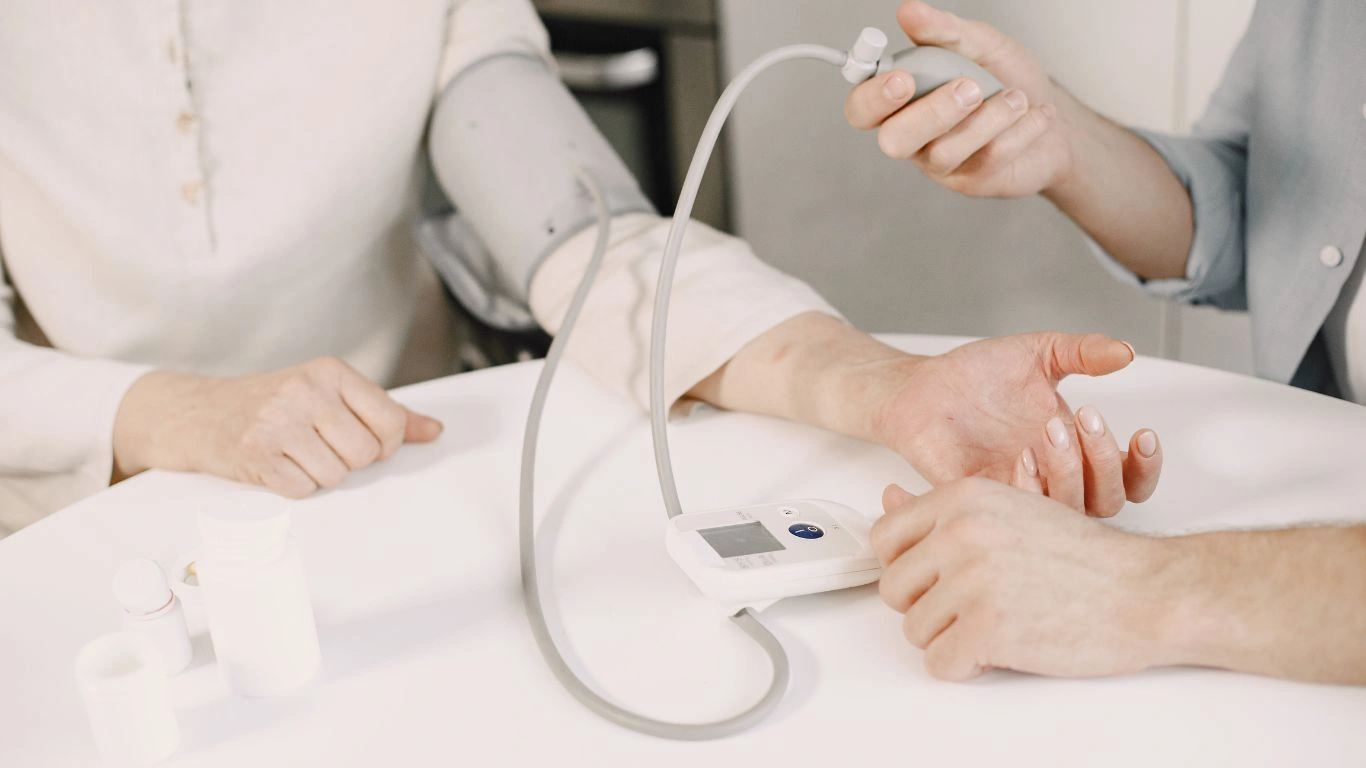The Powerful Link Between Blood Viscosity and Hypertension
When it comes to understanding high blood pressure, most people think of the heart working harder to pump blood through the arteries. But have you ever considered the role of blood viscosity in hypertension? That’s right, the thickness or stickiness of your blood can play a huge part in how your body handles blood pressure, and it’s something many of us don’t really talk about. As a hypertension expert, I’ve seen firsthand how this factor can make a real difference in managing high blood pressure. In this post, we’re going to dive into the relationship between blood viscosity and hypertension, looking at why it matters, and what it means for your health moving forward.
In my years of practice, I’ve noticed that a lot of people are unaware that blood isn’t just a fluid rushing through our bodies. It has a texture, a viscosity, which can fluctuate depending on various factors like hydration, diet, and even stress levels. It’s easy to overlook, but in the context of hypertension, the viscosity of blood can directly affect the way your arteries respond to pressure. So, let’s break down what this means in simpler terms.
The Link Between Blood Viscosity and Hypertension
First off, let’s talk about blood viscosity and its direct effect on hypertension. Viscosity refers to how thick or sticky your blood is. Think of it like the difference between water and syrup. Water flows easily, while syrup takes a lot more effort to pour because it’s much thicker. Similarly, when your blood is thicker than usual, it doesn’t flow as smoothly through your arteries, which can lead to increased pressure on the blood vessels. Over time, this added strain can cause the heart to work harder, potentially leading to the development of hypertension.
As you probably know, the heart’s job is to pump blood to all parts of your body. However, when blood viscosity increases, it becomes harder for your heart to push the blood through the arteries. It’s like trying to blow air through a clogged straw – it takes more effort and creates more resistance. This extra effort can gradually lead to chronic hypertension. And the worst part? High blood pressure can be a silent condition, creeping up over time without any noticeable symptoms until it’s too late.
How Blood Viscosity Affects Your Arteries
When blood becomes thicker, it puts more pressure on the walls of your arteries. This increased resistance means your heart has to work harder to circulate blood throughout the body, leading to what we call “high blood pressure.” Now, let’s get a little technical for a moment, but I promise it’s worth understanding. The more viscous your blood is, the more force your heart needs to generate to overcome the resistance in your arteries. This causes your arteries to stretch and contract more than they would with normal blood flow, and over time, this wear and tear can damage the arterial walls.
One thing that really stands out to me in my practice is that people don’t always connect the dots between lifestyle choices and blood viscosity. Things like dehydration, an unhealthy diet, smoking, and even stress can all contribute to thicker blood. In fact, I’ve had several patients who didn’t realize that something as simple as dehydration could be making their blood thicker and putting their health at risk.

The Role of Blood Cells in Viscosity
You might be wondering, “What exactly makes blood thick?” It’s all about the blood cells. In particular, the concentration of red blood cells and the amount of protein, such as fibrinogen, in your blood can increase viscosity. Essentially, if there are too many red blood cells, or if your body produces too much fibrinogen, your blood becomes thicker, leading to a greater chance of hypertension. Interestingly, this condition can occur even in people who are otherwise healthy.
In my experience, many people are surprised to learn that high blood viscosity isn’t always tied to being overweight or out of shape. It can affect people of all shapes and sizes. For example, athletes who are constantly training might have higher levels of red blood cells as their bodies adapt to increased physical demands. This doesn’t necessarily mean they have hypertension, but it can affect how their bodies react to stress and exertion. The takeaway here is that viscosity isn’t always something that’s visible on the outside, but it can still have a big impact on your health.

What Factors Contribute to Increased Blood Viscosity?
Now that you know what blood viscosity is and how it affects hypertension, let’s take a closer look at some of the factors that can cause your blood to become thicker than it should be. Some of these may seem obvious, but others may surprise you. Let’s break them down:
- Dehydration: When you’re dehydrated, your body has less water, and this can lead to thicker blood. Water is essential for maintaining a healthy blood flow, so make sure you’re drinking enough.
- Poor Diet: Diets high in fat, sugar, and processed foods can contribute to thicker blood. Foods that are rich in omega-3 fatty acids (like salmon and walnuts) can help reduce viscosity and improve heart health.
- Smoking: Smoking can increase red blood cell production, leading to higher blood viscosity. It’s a known fact that smoking has serious health consequences, and this is just one of many reasons why quitting can improve your overall health.
- Chronic Inflammation: Chronic conditions like arthritis and even stress can cause long-term inflammation in the body, which in turn increases blood viscosity.
As a hypertension expert, I can’t stress enough how important it is to pay attention to these factors. They might not seem directly linked to blood viscosity, but they all play a role in the overall picture of hypertension. By making small lifestyle changes, you can keep your blood viscosity in check and reduce your risk of developing high blood pressure in the long run.

How to Manage Blood Viscosity and Prevent Hypertension
Now that we’ve covered the basics of blood viscosity and how it impacts hypertension, let’s talk about what you can actually do about it. After all, understanding the issue is one thing, but taking action is what truly makes a difference. Over the years, I’ve seen how making small yet significant lifestyle changes can have a massive impact on people’s health. With a little bit of effort and some informed decisions, it’s totally possible to manage blood viscosity and prevent hypertension from taking hold.
Hydration: The Key to Thinner Blood
One of the simplest (and often overlooked) ways to manage blood viscosity is staying well-hydrated. It sounds easy, but you’d be surprised how many people aren’t drinking enough water throughout the day. And no, coffee, sodas, or even juice don’t count as proper hydration. While they may hydrate to some extent, they also come with other effects that can actually contribute to thicker blood, like caffeine or sugar. The truth is, water is your best friend here. When you’re well-hydrated, your blood is more fluid, and your heart doesn’t have to work as hard to push it through your arteries.
I can’t tell you how many times I’ve had patients come in complaining about symptoms of high blood pressure, only to find out that they’re barely drinking enough water during the day. It’s not that they don’t want to, but sometimes it’s just not a priority. If you’re aiming to keep your blood flowing smoothly and prevent hypertension, aim for around 8 glasses (about 2 liters) of water per day, though individual needs can vary based on activity level, climate, and overall health.

Diet: Foods that Help and Hurt
We’ve all heard the phrase, “You are what you eat,” and when it comes to blood viscosity, that couldn’t be more true. What you put in your body can either thin your blood or make it thicker, impacting your blood pressure over time. Let’s dive into some foods that can help keep your blood flowing smoothly, as well as some that might not be doing you any favors.
Foods that help:
- Omega-3 Fatty Acids: These healthy fats are famous for their heart benefits, and for good reason. They help reduce blood viscosity by decreasing the levels of fibrinogen (the protein that thickens blood) and reducing inflammation. Foods like salmon, mackerel, chia seeds, and flaxseeds are all great sources.
- Leafy Greens: Vegetables like spinach, kale, and collard greens are loaded with nitrates, which help relax blood vessels and improve circulation. This can reduce the overall viscosity of your blood.
- Beets: Beets are packed with natural nitrates that help lower blood pressure and improve blood flow. In fact, drinking beet juice has been shown to have a positive effect on reducing blood viscosity in some studies.
Foods that hurt:
- Trans Fats and Saturated Fats: These unhealthy fats, found in many processed foods, can contribute to a thickening of your blood. Fast food, fried snacks, and packaged baked goods are all sources to watch out for.
- Excessive Sugar: A diet high in refined sugar can increase inflammation in the body, which in turn can make blood thicker. Try to cut down on sugary snacks and drinks to maintain a healthy balance.
- Processed Meats: Bacon, sausages, and other processed meats often contain high levels of sodium, which can contribute to increased blood pressure and thicker blood over time.
Now, I don’t want to sound like a diet police officer. The occasional treat is totally fine, but it’s about finding a balance and making the right choices more often than not. Your diet doesn’t have to be perfect, but if you start prioritizing the foods that help thin the blood and limit the ones that contribute to thicker blood, you’ll be on the right track.

Exercise: Keep the Blood Pumping
Exercise is another powerful tool for managing blood viscosity and preventing hypertension. It’s one of the best ways to improve overall cardiovascular health and keep your blood flowing smoothly. Regular physical activity helps your body maintain a healthy weight, reduce inflammation, and increase blood circulation—all of which can help reduce blood viscosity.
Now, I know that not everyone loves hitting the gym, but it doesn’t have to be a hardcore workout session to make a difference. Even moderate exercise, like walking, swimming, or cycling, can help keep your blood flowing and maintain a healthy viscosity level. And if you’re someone who’s new to exercise or hasn’t been as active lately, just starting with 20-30 minutes of moderate activity a few times a week can have a huge impact on your heart health.
Over the years, I’ve seen patients who’ve come back after a few months of consistent exercise and have seen their blood pressure drop, their blood viscosity improve, and even felt better overall. It’s not just about the number on the scale—it’s about how your body functions. Plus, you’ll probably notice improvements in energy and mood, which is always a nice bonus!

Medication and Blood Viscosity: What You Should Know
In some cases, lifestyle changes alone might not be enough to manage blood viscosity, especially if you’re already dealing with hypertension or other underlying conditions. When that’s the case, medications might be necessary to help thin the blood or reduce its viscosity. There are several types of medications that can help, such as:
- Blood Thinners (Anticoagulants): Medications like aspirin or warfarin are often prescribed to prevent blood from clotting and help keep it flowing more smoothly. They can be particularly useful for individuals at high risk for stroke or other cardiovascular events.
- ACE Inhibitors and ARBs: These medications can help reduce blood pressure and also improve the function of blood vessels, indirectly impacting blood viscosity by making it easier for blood to flow through the arteries.
- Statins: Statins help lower cholesterol, which in turn can reduce the thickness of blood. Cholesterol can contribute to plaque buildup in arteries, leading to higher viscosity, so managing cholesterol is a key part of hypertension treatment.
However, it’s important to remember that medications should always be taken under the guidance of a healthcare professional. I’ve had several patients come to me asking if they can just take a pill and ignore lifestyle changes, but the truth is, medications work best when combined with healthy habits like hydration, a balanced diet, and regular exercise. It’s all about creating a well-rounded approach to managing hypertension and blood viscosity.
Understanding the Role of Stress in Blood Viscosity
If you’ve ever felt like your heart was racing or your blood pressure rising during a stressful situation, you’re not alone. Stress plays a big role in how your body reacts to and manages blood viscosity. I can’t tell you how many times I’ve had patients tell me they feel their heart pounding in their chest during stressful moments. The connection between stress and blood viscosity isn’t just metaphorical—it’s real.
When you’re stressed, your body releases hormones like adrenaline and cortisol. These hormones are great for giving you that burst of energy you need to handle immediate challenges, but they can also cause temporary changes to your blood, including thickening it. Stress increases your heart rate and makes your blood vessels constrict, which can raise your blood pressure and make blood flow less efficient. This is your body’s “fight or flight” response kicking in, but if stress becomes chronic, these effects can linger, contributing to higher blood viscosity over time.
The Cycle of Stress and Hypertension
Now, here’s the thing: stress doesn’t just thicken your blood in the moment. Over time, chronic stress can lead to lasting changes in your body, including persistent high blood pressure. High blood pressure, as we know, can then lead to further increases in blood viscosity, making the cycle of stress and hypertension harder to break.
One of the most powerful ways to manage blood viscosity is through stress management. It’s not always easy, especially in today’s fast-paced world, but finding ways to reduce stress can have a direct impact on both your blood pressure and the thickness of your blood. Simple techniques like mindfulness, deep breathing, yoga, and even taking regular breaks during the workday can do wonders. These practices can help lower cortisol levels, reduce inflammation, and keep your blood flowing smoothly.

The Importance of Regular Check-Ups
As much as we try to take control of our health, some things—like blood viscosity—can fly under the radar. That’s why I always encourage my patients to stay on top of their regular check-ups. Monitoring your blood pressure is one of the most effective ways to spot hypertension early and manage it before it turns into a bigger issue. But even more than just checking your blood pressure, regular visits with your healthcare provider can help identify changes in your overall cardiovascular health, including blood viscosity.
In my experience, people who visit their doctors regularly are often better at managing blood pressure and catching early signs of thicker blood. Routine lab work can sometimes reveal increased levels of certain proteins or blood cells that might indicate higher viscosity. Even if you don’t feel any symptoms, staying proactive is key.
The Role of Blood Tests and Monitoring
Blood tests can be particularly useful in understanding the factors that influence blood viscosity. These tests can help measure your cholesterol levels, red blood cell count, and the amount of fibrinogen in your blood—each of which can contribute to higher viscosity. By staying informed about these numbers, you can make more informed decisions about your diet, exercise, and overall lifestyle. For instance, if your cholesterol is high, your doctor may suggest dietary changes or medications to help manage it. If your red blood cell count is elevated, your doctor might investigate underlying causes, such as dehydration or an overactive bone marrow, that could be contributing to your condition.
Even though hypertension often goes unnoticed until it’s too late, regular blood tests provide you with a window of opportunity to stay ahead of the problem. The earlier you can spot trends in your blood health, the easier it will be to take action and reduce your risk of complications down the road.
Managing Blood Viscosity and Hypertension: A Holistic Approach
At the end of the day, the key to managing blood viscosity and preventing hypertension lies in a well-rounded, holistic approach. It’s not just about focusing on one factor like diet or exercise—it’s about understanding how all the pieces fit together. Your diet, hydration, exercise routine, stress management, and regular check-ups are all part of the puzzle. By prioritizing all of these areas, you can take control of your blood health and reduce the risk of developing hypertension.
From my personal experience, the most successful patients are the ones who see blood health as a comprehensive lifestyle choice rather than a series of isolated decisions. They understand that managing their blood viscosity is something they have to work on daily, and they’re willing to make small but meaningful changes to get the results they want. Whether it’s drinking more water, swapping out processed foods for healthier alternatives, taking up yoga, or committing to regular doctor visits, it all adds up.
If you’re someone who struggles with high blood pressure or concerns about blood viscosity, know that you don’t have to face it alone. There are so many resources and strategies available to help you manage your health effectively. It’s never too late to start making positive changes. Even small steps can make a huge difference in your cardiovascular health and overall well-being.

References
For further reading on hypertension and the role of blood viscosity, check out these trusted resources:
Disclaimer
The information provided in this article is for educational purposes only and should not be considered as medical advice. Always consult with a healthcare professional for personalized guidance regarding your health. Hypertension and blood viscosity are complex medical issues, and it’s essential to work with your doctor to develop an appropriate treatment plan tailored to your individual needs.

Dr. Gwenna Aazee is a board-certified Internal Medicine Physician with a special focus on hypertension management, chronic disease prevention, and patient education. With years of experience in both clinical practice and medical writing, she’s passionate about turning evidence-based medicine into accessible, actionable advice. Through her work at Healthusias.com, Dr. Aazee empowers readers to take charge of their health with confidence and clarity. Off the clock, she enjoys deep dives into nutrition research, long walks with her rescue pup, and simplifying medical jargon one article at a time.






